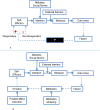Why Effective Interventions Do Not Work for All Patients: Exploring Variation in Response to a Chronic Disease Management Intervention
- PMID: 29939912
- PMCID: PMC6041152
- DOI: 10.1097/MLR.0000000000000939
Why Effective Interventions Do Not Work for All Patients: Exploring Variation in Response to a Chronic Disease Management Intervention
Abstract
Background: Half of all Americans have a chronic disease. Promoting healthy behaviors to decrease this burden is a national priority. A number of behavioral interventions have proven efficacy; yet even the most effective of these has high levels of nonresponse.
Objectives: In this study, we explore variation in response to an evidence-based community health worker (CHW) intervention for chronic disease management.
Research design: We used a convergent parallel design that combined a randomized controlled trial with a qualitative process evaluation that triangulated chart abstraction, in-depth interviews and participant observation.
Subjects: Eligible patients lived in a high-poverty region and were diagnosed with 2 or more of the following chronic diseases: diabetes, obesity, hypertension or tobacco dependence. There were 302 patients in the trial, 150 of whom were randomly assigned to the CHW intervention. Twenty patients and their CHWs were included in the qualitative evaluation.
Results: We found minimal differences between responders and nonresponders by sociodemographic or clinical characteristics. A qualitative process evaluation revealed that health behavior change was challenging for all patients and most experienced failure (ie, gaining weight or relapsing with cigarettes) along the way. Responders seemed to increase their resolve after failed attempts at health behavior change, while nonresponders became discouraged and "shut down."
Conclusions: Failure is a common and consequential aspect of health behavior change; a deeper understanding of failure should inform chronic disease interventions.
Conflict of interest statement
Figures
Similar articles
-
Changes in blood pressure among users of lay health worker or volunteer operated community-based blood pressure programs over time: a systematic review protocol.JBI Database System Rev Implement Rep. 2015 Oct;13(10):30-40. doi: 10.11124/jbisrir-2015-1927. JBI Database System Rev Implement Rep. 2015. PMID: 26571280
-
Effect of a Community Health Worker Intervention Among Latinos With Poorly Controlled Type 2 Diabetes: The Miami Healthy Heart Initiative Randomized Clinical Trial.JAMA Intern Med. 2017 Jul 1;177(7):948-954. doi: 10.1001/jamainternmed.2017.0926. JAMA Intern Med. 2017. PMID: 28459925 Free PMC article. Clinical Trial.
-
Community Health Worker Support for Disadvantaged Patients With Multiple Chronic Diseases: A Randomized Clinical Trial.Am J Public Health. 2017 Oct;107(10):1660-1667. doi: 10.2105/AJPH.2017.303985. Epub 2017 Aug 17. Am J Public Health. 2017. PMID: 28817334 Free PMC article. Clinical Trial.
-
Community pharmacy interventions for health promotion: effects on professional practice and health outcomes.Cochrane Database Syst Rev. 2019 Dec 6;12(12):CD011207. doi: 10.1002/14651858.CD011207.pub2. Cochrane Database Syst Rev. 2019. PMID: 31808563 Free PMC article.
-
Community Health Workers in Action: Community-Clinical Linkages for Diabetes Prevention and Hypertension Management at 3 Community Health Centers.Hawaii J Med Public Health. 2019 Jun;78(6 Suppl 1):15-22. Hawaii J Med Public Health. 2019. PMID: 31285963 Free PMC article. Review.
Cited by
-
Association between behavioral phenotypes and response to a physical activity intervention using gamification and social incentives: Secondary analysis of the STEP UP randomized clinical trial.PLoS One. 2020 Oct 14;15(10):e0239288. doi: 10.1371/journal.pone.0239288. eCollection 2020. PLoS One. 2020. PMID: 33052906 Free PMC article. Clinical Trial.
-
Changes in Blood Lipid Levels After a Digitally Enabled Cardiometabolic Preventive Health Program: Pre-Post Study in an Adult Dutch General Population Cohort.JMIR Cardio. 2022 Mar 23;6(1):e34946. doi: 10.2196/34946. JMIR Cardio. 2022. PMID: 35319473 Free PMC article.
-
The long-term benefits of early intensive therapy in chronic diseases-the legacy effect.Clin Kidney J. 2023 Aug 10;16(11):1917-1924. doi: 10.1093/ckj/sfad186. eCollection 2023 Nov. Clin Kidney J. 2023. PMID: 37915902 Free PMC article. Review.
-
Developing a research agenda for social prescribing in the UK using lessons from the US.Br J Gen Pract. 2022 Nov 24;72(725):589-592. doi: 10.3399/bjgp22X721445. Print 2022 Dec. Br J Gen Pract. 2022. PMID: 36424162 Free PMC article. No abstract available.
-
Impact of community health workers on diabetes management in an urban United States Community with high diabetes burden through the COVID pandemic.Prev Med Rep. 2024 Feb 9;39:102645. doi: 10.1016/j.pmedr.2024.102645. eCollection 2024 Mar. Prev Med Rep. 2024. PMID: 38370984 Free PMC article.
References
-
- Control CfD, editor. At a Glance 2015 National Center for Chronic Disease Prevention and Health Promotion Fact Sheet. Atlanta, GA: 2015.
-
- Mensah GA, Mokdad AH, Ford ES, Greenlund KJ, Croft JB. State of disparities in cardiovascular health in the United States. Circulation. 2005 Mar 15;111(10):1233–1241. - PubMed
-
- Schroeder SA. Shattuck Lecture. We can do better--improving the health of the American people. N Engl J Med. 2007 Sep 20;357(12):1221–1228. - PubMed
-
- Lorig KR, Sobel DS, Stewart AL, et al. Evidence suggesting that a chronic disease self-management program can improve health status while reducing hospitalization: a randomized trial. Med Care. 1999 Jan;37(1):5–14. - PubMed
-
- Lorig KR, Ritter P, Stewart AL, et al. Chronic disease self-management program: 2-year health status and health care utilization outcomes. Med Care. 2001 Nov;39(11):1217–1223. - PubMed
Publication types
MeSH terms
Grants and funding
LinkOut - more resources
Full Text Sources
Other Literature Sources
Medical



